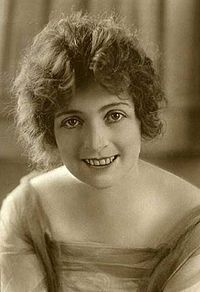Myrtle Gonzalez
Myrtle Gonzalez | |
|---|---|
 | |
| Born | September 28, 1891 Los Angeles, California, U.S. |
| Died | October 22, 1918 (aged 27) Los Angeles, California, U.S. |
| Occupation | Actress |
| Years active | 1913-1917 |
| Spouse(s) | James P. Jones (divorced, one child) Allen Watt (m.1917) |
Myrtle Gonzalez (September 28, 1891 – October 22, 1918) was an American actress. She starred in at least 78 silent era motion pictures from 1913 to 1917, of which 66 were one and two-reel shorts. She is regarded as Hollywood's first Latin and Hispanic movie star actress.[1]
Gonzalez was best known for her role as Enid Maitland in Vitagraph's six-reel feature length drama (1915) opposite William Duncan. A magazine writer once called her "The Virgin White Lily of the Screen."
Personal life[]
Myrtle Gonzalez was born in Los Angeles, California on September 28, 1891, the daughter of Manuel George Gonzalez (1868–?) and Lillian L. Cook (1874–1932). Her siblings were Stella M. Gonzalez (1892–1965) and Manuel G. Gonzalez, Jr. (1898–?).
Her paternal side comes from a native Hispanic Californio family of Mexico,[2] while her maternal grandparents were born in Ireland. Her father was a retail grocer, her mother a former opera and popular singer.
From early childhood, Myrtle displayed remarkable dramatic talent, and she had a good soprano voice. She appeared in many local concerts and benefits and sang in church choirs. She later played juvenile parts on the stage with Fanny Davenport and Florence Stone.
Gonzalez's first marriage was to James Park Jones. They had one son together, James Parks Jones, Jr. (c. 1911-1917), before they divorced.
Movie career[]

Because she grew up in Los Angeles, the shift of movie production to her hometown was a big advantage for her. Gonzalez worked for such studios as Vitagraph and Universal.
She appeared in five movies opposite William Desmond Taylor at Vitagraph, the comedy/drama Her Husband's Friend (1913), the drama Tainted Money (1914), the comedy Millions for Defence (1914), the drama The Kiss (1914), and the drama Captain Alvarez (1914).
In many of her roles, Gonzalez typified a vigorous out-of-doors type of heroine. During the last six years of her career, many of the movies she starred in were stories of the snow country and of the forests.
Personal life and death[]
On December 1, 1917, she and actor/director Allen Watt (1885–1944) were married in Los Angeles.[3] She then gave up her screen work and retired. Watt, who was formerly an assistant director at Universal, where they met, was then in the U.S. Army and she returned with him to Camp Lewis, in Washington state. Her health was too frail for the climate, however, and Capt. Watt was placed on the retirement list so he could return her to Southern California. He went back to work at Universal and began directing.
Gonzalez, at age 27, died during the worldwide Spanish flu pandemic of 1918. At the time of her death, she was at her parents' home in Los Angeles, at 908 West Thirtieth Street.[4][5]
Selected filmography[]
- A Natural Man (1915)
- It Happened in Honolulu (1916)
- The Secret of the Swamp (1916)
- The Greater Law (1917)
- Mutiny (1917)
- God's Crucible (1917)
- Southern Justice (1917)
- The Show Down (1917)
Bibliography[]
- (1995). The Ultimate Directory of Silent Screen Performers. pp. 30–31. Metuchen, New Jersey, Scarecrow Press. ISBN 0-8108-2958-4.
References[]
- ^ MeXicana encounters: the making of social identities on the borderlands By Rosa Linda Fregoso
- ^ MeXicana encounters: the making of social identities on the borderlands By Rosa Linda Fregoso
- ^ Los Angeles Times, Dec. 5, 1917, "Film Actress Bride Of Army Officer. --- Capt. Allen Watt Comes From Camp Lewis To Wed Miss Gonzalez," p. 14.
- ^ Los Angeles Times, Oct 23, 1918, "Murtle Gonzales Dead," p. II 1.
- ^ Los Angeles Times, Oct 30, 1918, "Actress Left No Will. --- Petition Filed for Letters of Administration in Estate of Myrtle Gonzales," p. II 4.
External links[]
| Wikimedia Commons has media related to Myrtle Gonzalez. |
- 1891 births
- 1918 deaths
- American film actresses
- American people of Mexican descent
- American people of Irish descent
- American silent film actresses
- American stage actresses
- Actresses from Los Angeles
- Deaths from Spanish flu
- 20th-century American actresses
- Hispanic and Latino American actresses